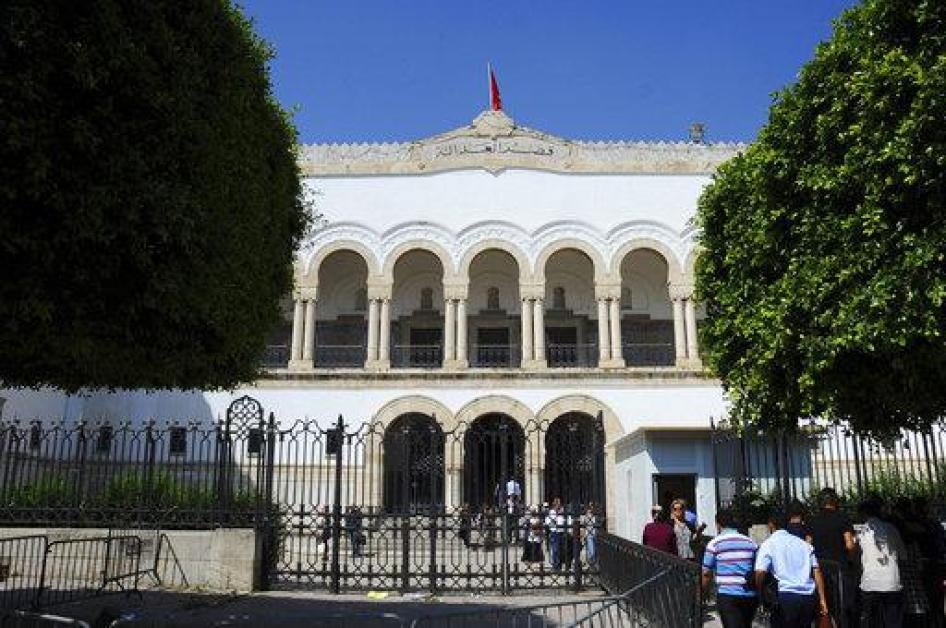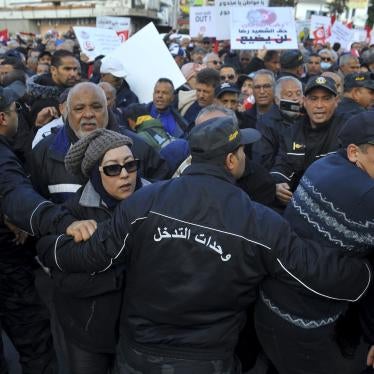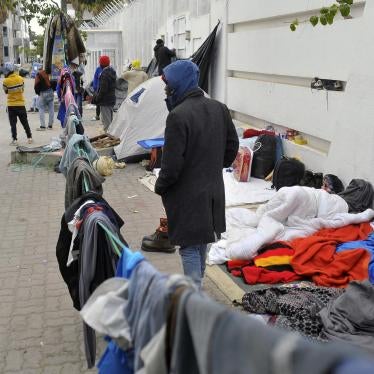(Brussels) – At their forthcoming meeting on March 20, European Union foreign affairs ministers should publicly press the Tunisian authorities to reverse their crackdown against perceived critics, four human rights groups said today.
The foreign affairs ministers should critically review their cooperation with Tunisia to avoid contributing to the ongoing undermining of human rights and of the independence of the judiciary that Tunisians have worked hard to secure since the 2011 revolution. The talks, where EU foreign affairs ministers will discuss the situation in Tunisia, follow recent EU statements that have failed to acknowledge, let alone condemn, the rapidly deteriorating human rights situation in the country.
In a letter sent ahead of the Foreign Affairs Council meeting, the undersigned organizations urged the EU and its Member States to press the Tunisian government, among other things, to halt the ongoing crackdown on dissent and repeal or amend all laws that criminalize the legitimate exercise of free speech and freedom of association.
On March 16, the European Parliament voted overwhelmingly in favor of an urgency resolution condemning the crackdown on judicial independence, freedom of expression, and association in Tunisia and echoed the organizations’ calls on the Tunisian authorities, the European Union, and member states.
Executive Interference in the Judiciary
“The Tunisian president is cracking down on his opponents,” said Hussein Baoumi, MENA advocacy officer at Amnesty International. “So why are EU leaders not ringing the alarm? EU leaders must ensure that their cooperation with the Tunisian authorities, especially with the Ministry of Justice, does not contribute to undermining the rule of law even further. And EU leaders should call on the Tunisian authorities to release all lawyers, politicians, journalists, activists and any others who have been arbitrarily detained.”
International Commission of Jurists (ICJ) director Said Benarbia said, “In order to protect the right to a fair trial, Tunisian authorities must immediately stop their systematic interference in the judiciary and reverse all decisions that have undermined judicial independence, including by reinstating those judges who were summarily dismissed. The Tunisian authorities must stop trying civilians before military courts and ensure that the courts do not become a tool of repression.”
Civil Society Organizations at Risk
“In the past few weeks, President Kais Saied’s government has rounded up opponents, curbed judicial independence, crushed freedom of expression, and incited hatred against African migrants,” said Philippe Dam, EU director at Human Rights Watch. “EU ministers should make it clear that such repression is incompatible with Tunisia’s obligations under international human rights law and with closer ties with the EU.”
Wadih Al-Asmar, president of EuroMed Rights, said, “There are worrying signs that the ability of Tunisian and international civil society organizations to operate freely in Tunisia is being restricted. Specifically, if enacted in its current formulation, a leaked draft law would grant the authorities significant powers to control associations’ activities, including their sources of funding, and would empower them to dissolve groups at will; this plan should be dropped.”
Staying true to their human rights commitments, the EU and its Member States should devise a unified, principled, and consistent strategy of engagement with Tunisia, using all available tools to reverse the rapidly growing crackdown on human rights, the groups said.
Signatories:
- Amnesty International
- EuroMed Rights
- Human Rights Watch
- International Commission of Jurists









